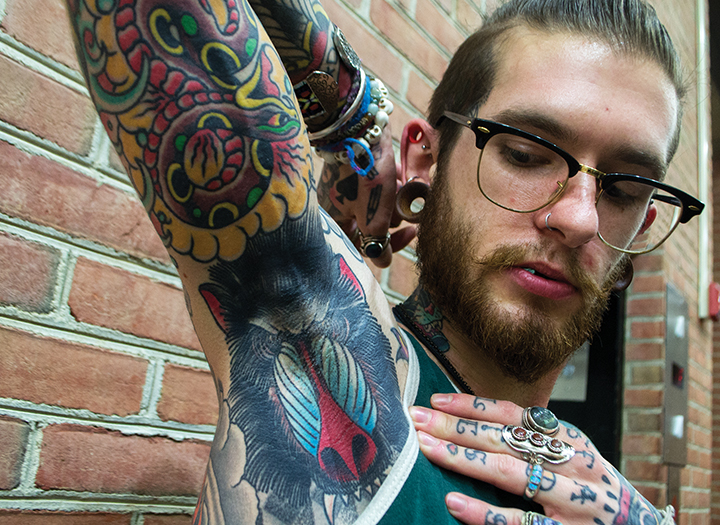
David Strohecker, a sociology doctoral candidate, displays some of his many tattoos. Strohecker’s studies have found that tattooing’s cultural place has changed in recent decades.
His nearly 10 years of accumulating tattoos began as an act of rebellion at age 18, but David Strohecker’s love of body art also sparked a passion for dispelling stigmas about tattoos.
After studying the art of tattooing for about five years, the sociology doctoral candidate found that its significance in society has changed dramatically throughout history, just as his own reasons for getting tattooed have evolved over the past decade.
“The stigma is decreasing, but it’s still out there,” Strohecker said. “My publicly stated goal was to challenge stereotypes.”
During the early days of tattooing in the U.S., typically only certain outsider groups such as carnival sideshow “freaks,” prostitutes and vagabonds were inked, he said. As time went on, it became common for servicemen coming home from World War II to get tattoos. The stereotype associating tattoos with criminals, ex-convicts and social deviants was formed early and has lingered to this day, he said, even though decades after the end of World War II, an entirely new group of people is participating in the art form.
It used to be common for a working-class person to walk into a tattoo parlor, pick a design off the wall and get it tattooed for $50. But now, young, college-aged people are investing large sums of money in designing individualized tattoos with personal meaning, Strohecker said.
“The middle-class approach to tattooing emerged in the ’90s,” he said. “Custom tattooing has become the hegemonic narrative.”
Caleb Dorsch, a junior chemistry major, has a tattoo on his inner bicep. It’s an image of the capsaicin molecule, the component responsible for chilis’ spice, representing his love of both science and music, specifically the Red Hot Chili Peppers.
“I wanted something I’ll have with me forever,” Dorsch said. “I really enjoyed the aesthetic appeal of it, being able to have something be a part of me and commemorate that long-term.”
Because he is aware of the stigma that still surrounds tattoos, Dorsch said he was sure to get his in a spot he could easily cover up.
Strohecker, on the other hand, did not take the same route — he is covered head to toe in colorful ink, except for a few spots on his palms, throat, head, ankles and upper thigh, which he said he is saving for more designs later in life.
He doesn’t know how many tattoos he has or how much money he has spent on them, but he said he will never forget his most painful tattoo, a bright blue and red mandrill’s face on his right armpit that took hours.
Sometimes, Strohecker said, he’s surprised at the positive reactions he elicits from people, such as when elderly women approach him at the grocery store to compliment his body art.
But he’s often aware of people’s judgmental gazes and biases, such as when a security guard at CVS followed him through the aisles while shopping just a few days ago, he said. Once, he was almost kept out of his own high school reunion party when a pub in Dallas tried to prevent him from entering, claiming he was too “underdressed” for the establishment.
Strohecker tries not to let others’ perceptions get to him, but the constant stares sometimes cause him anxiety, he said. He hopes stereotypes are changing, especially as more businesses, such as coffee shops and bars and nationwide chains such as Urban Outfitters, are now accepting — and even welcoming — tattooed employees.
But, he said, tattoos are still under attack from suggested regulations such as the Washington Health Department’s proposed tattoo waiting period, which, if enacted, would force people to make an appointment and wait 24 hours before getting inked, eliminating walk-in business for tattoo parlors.
Some students, such as freshman Sylviane Alexion, said people should think before making a decision that will affect them for the rest of their lives.
“I have a habit of liking something, and then, after a while, I really don’t like it,” the accounting major said. “Why would I spend a ton of money, go through pain and get something that I might hate in three months?”
Small tattoos aren’t bad, but big, extensive ones aren’t pleasant to look at and may hurt future job prospects, Alexion said.
“I don’t consider them professional,” she said, “and I don’t think that’s going to change anytime soon.”



